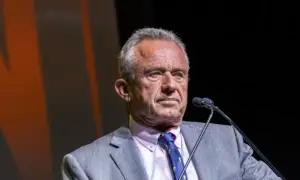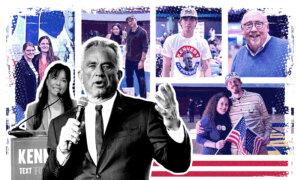It’s debatable who is most affected by Robert F. Kennedy Jr.’s presidential bid, but it’s clear that his candidacy has an impact. Some contend that Mr. Kennedy is the most popular third-party candidate since Ross Perot in 1992.
Similarly, this election cycle’s independent candidate likely appeals to disenchanted supporters of both parties.
In a head-to-head race, former President Donald Trump leads President Joe Biden by 2 percent. However, in a race that includes third-party candidates, President Biden leads with 39 percent of the vote, followed by President Trump with 37 percent, and Mr. Kennedy with 13 percent. Cornel West and Jill Stein would receive two percent and three percent of the vote, respectively.
Mr. Kennedy is the son of former Sen. Robert F. Kennedy and the nephew of former President John F. Kennedy.
The environmental attorney is a presidential candidate representing the We the People Party. Mr. Kennedy was a lifelong Democrat, but as the party strayed from its core principles in the 2010s, he grew increasingly estranged from the party of his roots. On Oct. 9, 2023, he declared his intention to run as an independent candidate for president of the United States.
Several analysts agree that the campaigns themselves will determine how Mr. Kennedy affects the presidential election outcome.
Democrats Worried
Democratic strategist Jim Kessler of the centrist Democrat think tank Third Way contends Mr. Kennedy has a more significant effect on President Biden’s campaign than President Trump’s.
“Voters kick the tires on third-party candidates,” Mr. Kessler told The Epoch Times. “At some point, they decide it’s a wasted vote.
Third-party presidential candidates have persisted in the past few decades, albeit with mixed results. Even though they received some support in their respective elections, candidates like Mr. Perot and Ralph Nader of the Green Party ultimately failed to secure any electoral votes. More recently, the Green Party’s Jill Stein and the Libertarian Party’s Gary Johnson entered the presidential race, but neither party has achieved much electoral success.
Mr. Kessler questions whether voters know anything about Mr. Kennedy beyond his name recognition and says historically, third-party candidates max out.
“He has a name they think they recognize,” Mr. Kessler said. “But do they really know the person of RFK Jr?”
Mr. Kessler acknowledges that some in Mr. Kennedy’s family don’t support his campaign and says gossip publications find that information irresistible.
RFK Jr. Rejects Spoiler Label
Dick Russell, author of “The Real RFK Jr.: Trials of a Truth Warrior,” knows well the issues that might attract voters—ranging from Mr. Kennedy’s pursuit of the truth about the assassinations of his father and uncle, the murder conviction of his cousin, and the narratives around the COVID-19 pandemic, and corporate America’s role in environmental challenges are issues many politicians avoid.
“He’s his own man and a very independent thinker,” said Mr. Russell.” I’ve known him for more than 20 years. He’s willing to take on the powers that be like Anthony Fauci.”
Most political strategists say they take Mr. Kennedy’s campaign seriously and he will do well if voters are uninspired with the current options.
“He’s not in it to be a spoiler, and he’s in it to win,” said Mr. Russell. “He’s working hard to get on the ballots. When people hear him speak about the issues, their interest is piqued.”
Mr. Russell adds that Mr. Kennedy’s battles with addiction, which he eventually overcame, make him relatable to the average voter.
Mr. Kennedy, a former heroin addict, has advocated for the billions of taxpayer dollars sent to Ukraine to be diverted to support “healing farms” for Americans struggling with alcohol and drug addiction.
“He’s been to the bottom himself, so he understands what parents go through with their children and maybe themselves,” said Mr. Russell. “His moral courage is an integral part of his character. He’s worked closely with regular people and talks much about the middle class.”
Mr. Kennedy’s campaign claims it is working on getting on the ballot in all 50 states and the District of Columbia. As an independent, he was on the ballot in Utah and Michigan by mid-April. Mr. Kennedy’s supporters maintain that he is not running for president to give an advantage to someone else. According to those who believe he is the real deal, he has a chance to secure the 270 electoral votes required to win the presidency.
In addition to Utah and Michigan, the Kennedy campaign reports to have finished collecting signatures in seven additional states: Nevada, Idaho, Hawaii, New Hampshire, North Carolina, Nebraska, and Iowa.
Will Rational or Emotional Voters Show Up?
Rick Manning, president of Americans for Limited Government, a group that has endorsed President Trump, says that when given the RFK Jr. option, independents voting for Trump are likelier to vote for Mr. Kennedy.
“The election situation will be radically different six months from now,” said Mr. Manning. “Other than the position on COVID-19 vaccines, when people hear what Kennedy has to say about the issues, conservative-leaning voters will go to President Trump because they disagree with Kennedy on many of his policy positions.”
Mr. Manning asserts that the disapproval of President Biden’s handling of the presidency is overwhelmingly poor, with the recent NBC poll finding President Biden’s approval rating to be 42 percent.
“The question that exists is will people who disagree with Biden and view him as less competent than Trump—lean toward Trump,” said Mr. Manning. “It comes down to whether a voter’s rational or emotional mind wins.”
Original News Source Link – Epoch Times
Running For Office? Conservative Campaign Consulting – Election Day Strategies!


